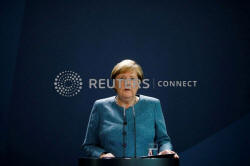Bleak budget outlook leaves Merkel's conservatives no choice on debt
 Send a link to a friend
Send a link to a friend
 [February 25, 2021] BERLIN
(Reuters) - Germany's bleak budget outlook is pushing Chancellor Angela
Merkel's conservatives towards supporting another suspension of national
rules on debt next year, with the man in pole position to succeed her
advocating another waiver. [February 25, 2021] BERLIN
(Reuters) - Germany's bleak budget outlook is pushing Chancellor Angela
Merkel's conservatives towards supporting another suspension of national
rules on debt next year, with the man in pole position to succeed her
advocating another waiver.
The coalition is currently discussing when Berlin should end massive
deficit-spending triggered by the COVID-19 pandemic, and return to the
fiscal rules of the constitutionally enshrined debt brake. Parliament
suspended those rules for 2020 and 2021 to allow combined new borrowing
of up to 310 billion euros in both years.
Finance Minister Olaf Scholz, who is expected to present the draft
budget for 2022 next month, has already hinted it could be difficult to
keep new borrowing below the ceiling of 0.35% of gross domestic product
as required by the rules.

"The numbers are just brutal. Everyone who has looked at the budget in
detail can't help but demand another exception from the debt brake
again," a coalition source told Reuters on Thursday on condition of
anonymity.
The source said it was simply impossible to cut 60 billion to 80 billion
euros in the budget just to get public finances in line with the rules
again - especially with Germany heading towards a federal election in
September.
Armin Laschet, the new leader of Merkel's Christian Democratic Union (CDU),
said in a newspaper interview that there was probably no other way than
to suspend the debt brake again.
"Next year, we will surely have to use Article 115 of the Basic Law
again for an exception to the debt brake", Laschet told Stuttgarter
Zeitung.
[to top of second column] |

German Chancellor Angela Merkel speaks to the media during a
statement about latest developments in the case of Russian
opposition leader Alexei Navalny at the chancellery in Berlin,
Germany September 2, 2020. Markus Schreiber/Pool via REUTERS/File
Photo

Laschet even suggested that it could be difficult to stick to the fiscal rules
beyond next year.
"Nobody today can reliably predict how what the financial needs will look like
after 2022. Whether we'll still have to declare the fiscal emergency then
depends on the further development of the pandemic," Laschet said.
The comments increase the chances for Germany will continue its debt-financed
fiscal splurge next year. This would set the tone for the wider debate in the
euro zone on how much longer governments should keep spending to fight the
crisis.
In January, Merkel's chief of staff Helge Braun opened the door for continued
deficit spending with a proposal to soften Germany's debt issuance law, because
Berlin would not be able to stick to the strict limits on borrowing for several
more years.
But a reform of the rules would need a two-thirds majority in both chambers of
parliament - a tricky task given Germany's increasingly splintered political
landscape with seven parties.
(Reporting by Michael Nienaber, editing by Larry King)
[© 2021 Thomson Reuters. All rights
reserved.] Copyright 2021 Reuters. All rights reserved. This material may not be published,
broadcast, rewritten or redistributed.
Thompson Reuters is solely responsible for this content.
 |